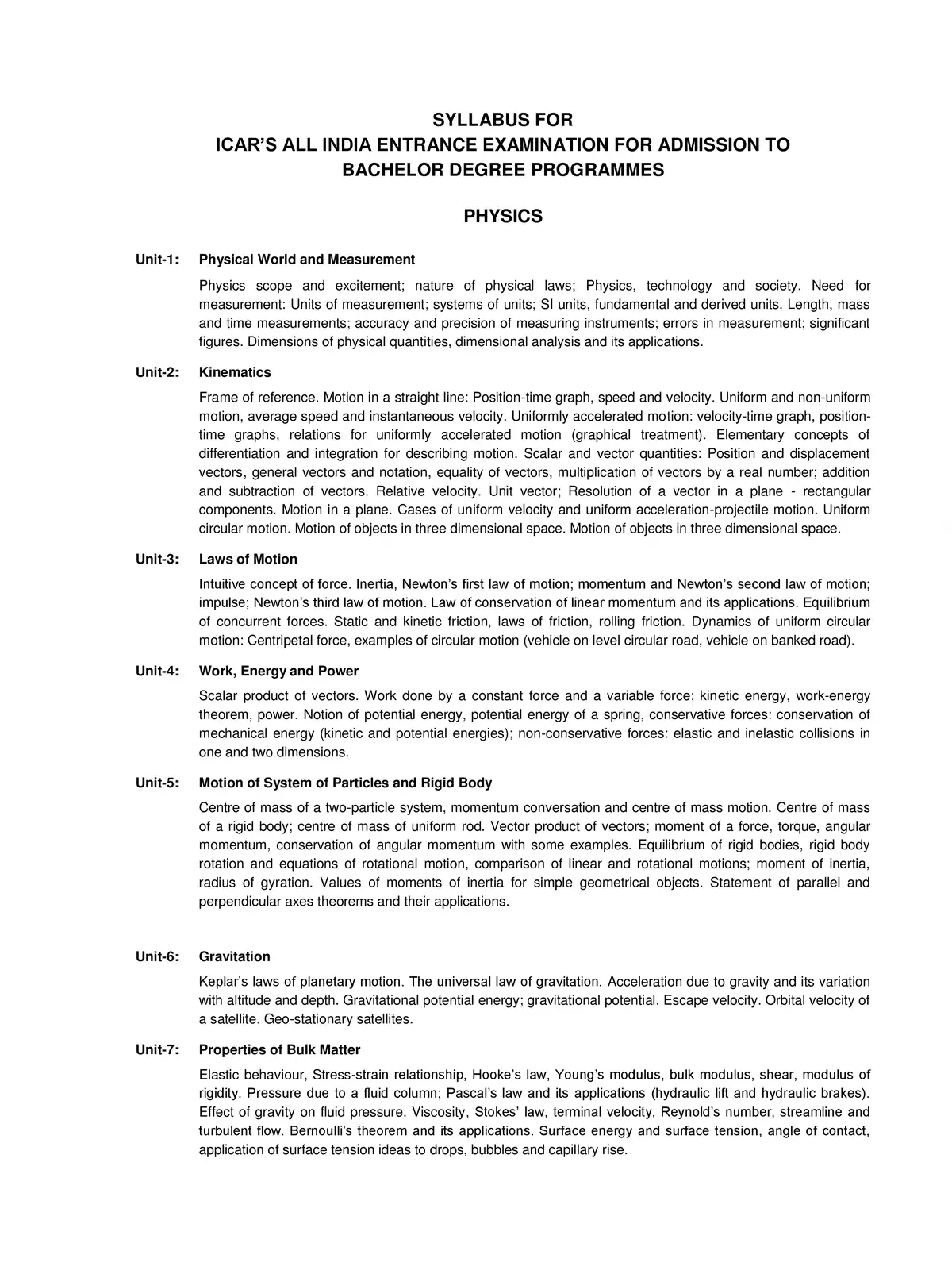ICAR UG Syllabus 2020 - Summary
NTA conducts the Indian Council of Agricultural Research (ICAR) online exams for admission to Bachelor UG, Masters PG & Ph.D. Courses in Agricultural Universities (AUs), and award of scholarships and fellowships in recognized Indian College & Universities.
NTA ICAR 2020 Exam Pattern
| ICAR Exams | Max Marks | Number of Questions (All are compulsory) | Duration |
| ICAR AIEEA (UG)-2020 | 600 | 150 (50 in each subject) | 02½ hours (150 minutes) |
| ICAR AIEEA (PG)-2020 | 480 | 120 | |
| ICAR AICE-JRF/SRF (Ph.D.)-2020 | 480 | 120 (Part A-20) + (Part B-50) + (Part C-50)* | 02 hours (120 minutes) |
| Note: *{Candidates are advised to visit http://icar.org.in/node/13680 regarding the revised plan of AICE JRF/SRF (Ph.D.)} | |||
The test would consist of three sections.
Subtest/Section A – First 20 MCQs will be common to all the 73 specialized Subjects. The questions assess the level of the candidate’s awareness about the environment and its application to society. The questions are based on general knowledge in the domain of Agriculture, Animal Husbandry, Dairying, Fisheries, and Allied Sciences, etc. including current events and matters of everyday observation and experience.
Subtest/Section B – 50 MCQs will be from the Core Group (refer Table 1) containing the specialized Subject opted by the candidate for pursuing a Ph.D.
Subtest/Section C – 50 MCQs will be from one of the specialized Subjects (Annexure-III) opted by the candidate for pursuing a Ph.D.
Here is the List for Core Groups for Section-B of AICE-JRF/SRF (Ph.D.) Examination:
| Core Group | Subjects for examination |
| 01 Crop Sciences-I | 1.1 Genetics & Plant Breedin |
| 1.2 Seed Science & Technology | |
| 1.3 Economic Botany and Plant Genetic Resources | |
| 02 Crop Sciences- II | 2.1 Plant Pathology |
| 2.2 Nematology | |
| 2.3 Agricultural Entomology/Entomology | |
| 2.4 Sericulture | |
| 03 Crop Sciences- III | 3.1 Plant Biochemistry/Biochemistry |
| 3.2 Plant Physiology/Crop Physiology | |
| 3.3 Agricultural Biotechnology/Biotechnology/Molecular Biology & Biotechnology | |
| 3.4 Agricultural Microbiology/Microbiology | |
| 04 Horticulture | 4.1 Vegetable Science/Olericulture |
| 4.2 Fruit Science/Pomology | |
| 4.3 Floriculture & Landscaping/Floriculture & Landscape Architecture | |
| 4.4 Spices, Plantation, Medicinal & Aromatic Plants | |
| 4.5 Post Harvest Technology (Horticulture) | |
| 05 Veterinary and Animal Sciences-I | 5.1 Animal Genetics & Breeding |
| 5.2 Animal Nutrition | |
| 5.3 Livestock Production Management | |
| 5.4 Livestock Products Technology | |
| 5.5 Poultry Science | |
| 06 Veterinary and Animal Sciences-II | 6.1 Veterinary Parasitology |
| 6.2 Veterinary Public Health/Veterinary Public Health & Epidemiology | |
| 6.3 Veterinary Microbiology | |
| 6.4 Veterinary Pathology | |
| 07 Veterinary and Animal Sciences-III | 7.1 Veterinary Medicine |
| 7.2 Veterinary Pharmacology & Toxicology | |
| 7.3 Vety. Gynaecology & Obstetrics/Animal Reproduction, Gynaecology & Obstetrics | |
| 7.4 Veterinary Surgery & Radiology/Veterinary Surgery | |
| 7.5 Veterinary Anatomy/Veterinary Anatomy & Histology | |
| 08 Veterinary and Animal Sciences-IV | 8.1 Veterinary Physiology/Animal Physiology |
| 8.2 Veterinary Biochemistry/Animal Biochemistry | |
| 8.3 Animal Biotechnology | |
| 09 Dairy Science, Dairy Technology & Food Technology | 9.1 Dairy Chemistry |
| 9.2 Food Technology | |
| 9.3 Dairy Microbiology | |
| 9.4 Food Safety and Quality Assurance | |
| 9.5 Dairy Technology | |
| 9.6 Dairy Engineering | |
| 10 Agricultural Engineering and Technology | 10.1 Farm Machinery and Power Engineering |
| 10.2 Soil and Water Conservation Engineering /Soil and Water Engineering | |
| 10.3 Agricultural Processing and Food Engineering | |
| 10.4 Renewable Energy Engineering | |
| 10.5 Irrigation Water Management Engineering/Irrigation & Drainage Engineering | |
| 11 Community Science (Formerly Home Science) | 11.1 Family Resource Management |
| 11.2 Textiles and Apparel Designing | |
| 11.3 Human Development and Family Studies/Human Development | |
| 11.4 Food Science and Nutrition/Human Nutrition | |
| 11.5 Home Science Extension and Community Management | |
| 12 Fishery Science-I | 12.1 Fisheries Resource Management |
| 12.2 Fish Processing Technology/Fish Post-Harvest Technology | |
| 12.3 Fisheries Engineering & Technology | |
| 12.4. Aquatic Environment Management | |
| 13 Fishery Science-II | 13.1 Aquaculture |
| 13.2 Fish Health Management/Aquatic Animal Health Management | |
| 13.3 Fish Nutrition and Feed Technology | |
| 14 Fishery Sciences-III | 14.1 Fish Genetics and Breeding |
| 14.2 Fish Biotechnology | |
| 14.3 Fish Physiology and Biochemistry | |
| 15 Natural Resource Management – I | 15.1 Forestry/Agroforestry |
| 15.2 Agricultural Meteorology | |
| 15.3 Environmental Sciences | |
| 15.4 Agricultural Physics | |
| 16 Natural Resource Management – II | 16.1 Agronomy |
| 16.2 Soil Sciences/Soil Science & Agricultural Chemistry | |
| 16.3 Agricultural Chemicals | |
| 16.4 Water Science & Technology | |
| 17 Agricultural Economics & Agri-Business Management | 17.1 Agricultural Economics |
| 17.2 Agri-business Management | |
| 18 Agricultural Extension | 18.1 Agricultural Extension/ Extension Education/Communication |
| 19 Agricultural Statistics | 19.1 Agricultural Statistics |
| 19.2 Bioinformatics | |
| 19.3 Computer Application & IT |
